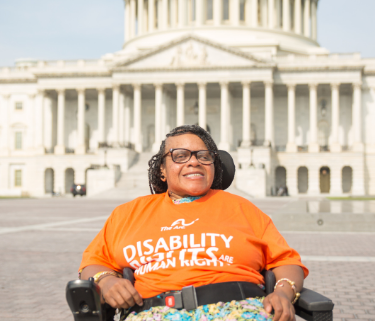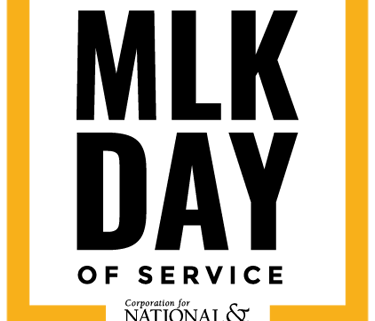The ADA Turns 31
Today, we mark 31 years since the passage of the Americans with Disabilities Act (ADA). The Arc is proud of our long history advocating with and for people with intellectual and developmental disabilities (IDD) and working to ensure that their most fundamental rights and the protections guaranteed by the ADA are recognized and fulfilled.
Thelma Green, 61, is a self-advocate in Washington, D.C. who The Arc profiled in a story in 2017 about the importance of Medicaid in her life. On this anniversary of the ADA, Thelma, a wheelchair user, shared reflections on what the landmark law means to her. She was a young woman when the ADA passed in 1990.
“The biggest change is that I got more than once choice for transportation and being able to get around and have stuff more accessible,” she said.
Thelma says before the ADA was passed into law, navigating the community was tough.
“Back then, they didn’t have accessible cabs or Metro Access. It was really difficult,” Thelma tells The Arc.
And she says daily living was more challenging and people treated her with less respect.
“I think it was more difficult before because people weren’t really listening to us. They weren’t taking people with disabilities seriously enough until a family member stepped in,” she explained.
The ADA transformed the country in important ways, changing expectations for the lives of people with disabilities. The law requires accessibility and bans discrimination in almost all private businesses, and has significantly reduced discrimination in state and local government services. The transportation and paratransit provisions have yielded greater mobility and community participation. Employment provisions have been important, for example, providing protections in the hiring process and expanding the use of job accommodations for workers with disabilities. The built environment has tangibly changed based on the requirements of the ADA, for example, ramped building entrances and curb cuts on sidewalks are now common. In major ways, people with disabilities are closer to the goals of equality of opportunity, full participation, independent living, and economic self-sufficiency defined in the law.
But Thelma knows the fight for equity is far from over, and The Arc and our allies are advocating for stronger enforcement of this civil rights law.
“You have to continue on fighting for the same rights that everybody else has. We need to have more accessible places for people with wheelchairs and crutches to make it much easier for them to get it and more accessible buildings,” she said.
On this anniversary, Thelma also wants people to recognize and be sensitive to people who have hidden disabilities that are not always obvious. Across the United States, more than 6 million people have hidden, or invisible disabilities, like autism, sensory disorders, or dyslexia. And, they also entitled to the protection of the ADA.
As we renew our commitment to the ADA, and the charge to eliminate unjustified segregation and exclusion of people with disabilities from American life, The Arc reaffirms our goal to protect against forms of discrimination based on disability, race, sex, gender identity and expression, sexual orientation, national origin, or any other protected status. We will keep fighting to defend the rights and lives of Thelma and all people with disabilities and their families, and advance toward full inclusion for all.











